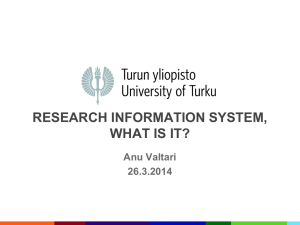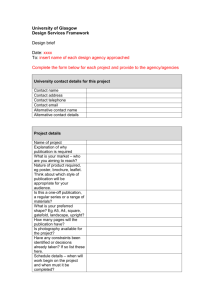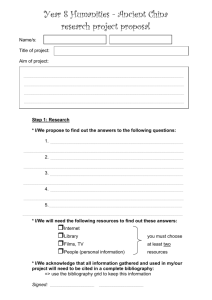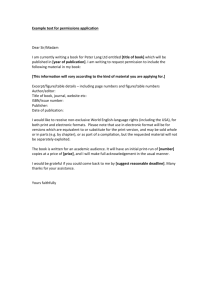A short introduction to scientific publishing
advertisement
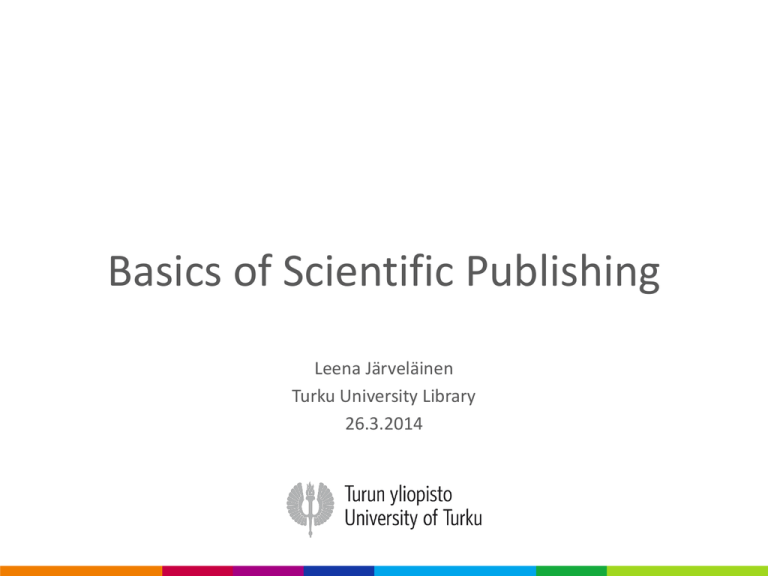
Basics of Scientific Publishing Leena Järveläinen Turku University Library 26.3.2014 This presentation in short 1. 2. 3. 4. Why publish research? What and where to publish? What about University of Turku? Some future trends 1. Why publish research? Why researchers publish? "Researchers are driven by a desire to enhance our knowledge and understanding of the world we inhabit, and to communicate their findings to others." Research Information Network (2009): Communicating knowledge: How and why UK researchers publish and disseminate their findings (pdf-file) Research Information Network (2011): Social Media: A guide for researchers (pdf-file) The new university financing model 2013 Yliopistojen rahoitusmalli 2013 alkaen (pdf); abstract of the proposal (2011) in English; both from the web pages of Ministry of Education and Culture 2. What and where to publish? What type of publication? A B C D E F G H I Peer-reviewed scientific articles Non-refereed scientific articles Scientific books (monographs) Publications intended for professional communities Publications intended for the general public Public artistic and design activities Theses Patents and innovation announcements Audiovisual material, ICT software According to Ministry of Education and Culture Publication Data Collection Manual 2012 (pdf-file; English version 10 January 2013; the newest version only in Finnish) Different disciplines, different channels • refereed / peer reviewed articles in international scientific journals are highly valued within the scientific community • The high status of refereed articles is emphasized especially in medical and natural sciences, where they clearly dominate publishing. • In social sciences and humanities, monographs and edited books are still the most common type of publication. • Engineering is characterised by a high publishing activity in conference proceedings. Hanna-Mari Puuska ja Marita Miettinen. 2008. Disciplinary differences in publishing practices. (The whole document in Finnish; abstract in in English) What is a scientific publication? Definition of a scientific publication • must generate new information • must be presented in a form that allows the research results to be verified and/or used in a new study • the publication and at least its bibliographic data must be presented in a language and published through a channel that makes it available to all interested researchers • the publication channel must have an evaluation practice in place, whereby the text intended for publication is evaluated by at least one external party familiar with the field According to Ministry of Education and Culture Publication Data Collection Manual 2012 (pdf-file; English version 10 January 2013; the newest version only in Finnish) Peer-review process Cartoon: Nick (Nick D. Kim) Which journals or publishers to choose? Some things to consider: • What does your supervisor say? • What is the discipline and the purpose of your article? • What is the reputation of the journal? • impact factor (see Journal Citation Reports) • Publication Forum (Julkaisufoorumi) classification (1-3): see e.g. Search page • Jeffrey Beall's List of Predatory Publishers 2014 • Will you publish at traditional or open access channels? • University of Turku recommendation 23.4.2007, 375/002/2007 • Consult your peers! 3. What about University of Turku? Publishing your dissertation The Doctoral Candidate is responsible for publishing and distributing the dissertation. The dissertation can be published in the University's own Annales series or by an outside publisher. More detailed information see: Guidelines for the Doctoral Candidate Publishing in the Turku University Series The Turku university library maintains the publication archive of the University of Turku and deals only with two series • Publications of the University of Turku – Annales Universitatis Turkuensis • University of Turku doctoral dissertations • all dissertations with permission from faculty are accepted • The School of Economics Publication Series • different types of publications; Series A = dissertations • the author submits a written application to the Publication Board of TSE More detailed information see: http://utu.fi/library > Request, Buy, Publish > Publish http://www.utu.fi/en/units/library/requestbuypublish/publish/publishingdoctoral-dissertation/Pages/home.aspx Your affiliation is University of Turku • • • • Affiliation relates to where the author was at the time the research leading to the publication was conducted. ”…the author has been in an employment relationship with the institution while conducting the research and writing the publication, or the institution has been a key facilitator of the publication by offering facilities or guidance (including postgraduate students or scientists who are beneficiaries of a grant). The affiliation with the higher education institution is primarily established on the basis of affiliations mentioned in the publication (in other words, the author gives the name of the institution in the publication).” rector's letter 20.2.2009, 130/002/2009 According to Ministry of Education and Culture Publication Data Collection Manual 2012 (pdf-file; English version 10 January 2013; the newest version only in Finnish) See also: http://en.wikipedia.org/wiki/List_of_Nobel_laureates_by_university_affiliation Changes in scientific publishing See e.g. • http://www.theguardian.com/science/peer-reviewscientific-publishing Thank you for your attention! Leena Järveläinen, leena.jarvelainen@utu.fi
